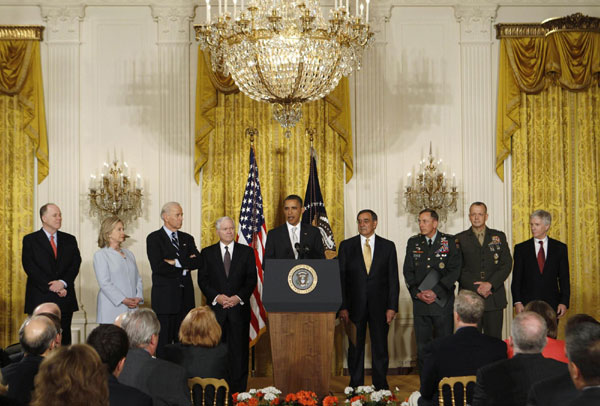Politics
Obama unveils shakeup of national security team
Updated: 2011-04-29 09:16
(Agencies)
WASHINGTON - President Barack Obama announced a national security reshuffle on Thursday, altering the chemistry of a team that will help set strategy on the war in Afghanistan, turmoil in the Middle East and defense budget battles in Washington.
|
||||
The appointments mark the biggest realignment of Obama's war council to date and could have broad implications for his administration's plans to start withdrawing US forces from Afghanistan in July and to seek deeper Pentagon spending cuts.
The shake-up also could give impetus to shaping the US military role in the Libya conflict and to what has been dubbed the "Obama doctrine," a still-evolving US policy on how to respond to unrest sweeping the Arab world.
"I felt it was absolutely critical to have this team in place so that we can stay focused on our mission, maintain our momentum and keep our nation secure," Obama said at the White House with Panetta and Petraeus at his side.
Obama called for swift Senate confirmation of his nominees. Praise for the men from Democratic and Republican lawmakers alike suggested the process would go smoothly.
The changes were set in motion by the impending departure of Defense Secretary Robert Gates, a holdover from the Bush administration who had gained Obama's trust.
The realignment raises questions about what kind of influence Secretary of State Hillary Clinton and Vice President Joe Biden, two of the administration's most powerful foreign policy voices, will wield within the national security apparatus.
Panetta, a Democratic Party insider and former White House budget chief, is expected to oversee steady declines in Pentagon spending in order to divert weapons dollars to the Treasury Department to help reduce the US deficit.
Petraeus is considered one of the top US commanders, mixing political savvy with military know-how, and his move raises questions about the future of the unpopular, nearly decade-old war in Afghanistan.
Analysts fear his departure could derail momentum and undermine efforts to improve US ties with Pakistan.
Seeking to show continuity, Obama also nominated trouble-shooting diplomat Ryan Crocker, who has served as ambassador to Iraq, Pakistan, Syria, Kuwait and Lebanon, as the US ambassador to Afghanistan. Lieutenant General John Allen, deputy commander of US Central Command, was named to succeed Petraeus as head of the Afghan war effort.
Specials

British Royal Wedding
Prince William and Kate Middleton married at Westminster Abbey in a royal occasion of dazzling pomp and pageantry.
Best wishes

The final frontier
Xinjiang is a mysterious land of extremes that never falls to fascinate.

Bridging the gap
Tsinghua University attracts a cohort of foreign students wanting to come to China.




